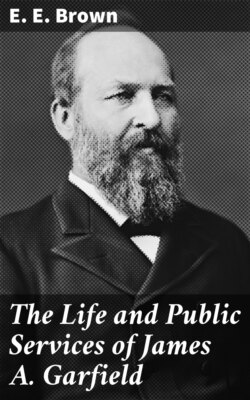Читать книгу The Life and Public Services of James A. Garfield - E. E. Brown - Страница 11
На сайте Литреса книга снята с продажи.
CHAPTER VII.
ОглавлениеTable of Contents
Return to Geauga Seminary.—Works at Haying through the Vacation.—Teaches a higher Grade of School.—First Oration.—Determines to Go to College.—He visits the State Capitol at Columbus.
When James returned to the academy, he made an arrangement with Mr. Woodworth, by which he could have a comfortable boarding-place at one dollar and six cents a week. This was at Mr. Woodworth's own house, and the payment was to be taken out in labor at the carpenter's shop. It was an excellent plan, and gave James more time for his studies, in spite of the hard manual labor he performed out of school-hours. He could use the square and the scratch-awl now, as well as the plane; and his wages were correspondingly increased.
In the summer vacation of his third term at Geauga, James and a schoolmate resolved to earn a little money at haying. They accordingly hired themselves out to a neighboring farmer who wanted some extra hands. Noticing how vigorously the boys worked, the farmer turned to his men and said—
"Lookee here, you lubbers! these boys are gitting way ahead of you. They make broader swaths, and they mow a sight better than you do!"
When the haying was done, and the settling day came, the farmer asked the boys what wages they expected.
"Whatever you think is right," replied James.
"Wall," said the farmer, "as yer only boys, of course yer won't expect men's wages."
"But didn't you say yourself," argued James, "that we did more work than your men? If that is so, why should you pay us less?"
The farmer was nonplussed, and gave the boys the same wages he paid his men, remarking, as he did so—
"It's the fust time I ever paid boys so much, but you've fairly earned it—that's a fact!"
It was just about this time that the anti-slavery contest began to assert itself throughout the country.
In the little Debating Club at Geauga, the question was given out, "Ought slavery to be abolished in this republic?" It was a subject that roused James to his best efforts; and his school-mates, as they listened to his fiery denunciations against slavery, declared that "Jim ought to go to Congress!"
The following winter James procured a school at Warrensville, where he was paid sixteen dollars a month and his board, which was more than he had ever earned before. It was in this school that one of the pupils wanted to take up geometry—a branch of mathematics that James had never studied.
As usual, however, he was equal to the emergency. Buying a text-book, he studied geometry after school-hours, until he had mastered the science, and his pupils never once dreamed but that he was as familiar with it as with algebra or arithmetic.
It was at the annual exhibition of Geauga Seminary, in November, 1859, that James delivered his first oration. It was prepared with his usual carefulness, and delivered with so much magnetic earnestness that the whole audience were held spell-bound.
"He is bound to make his mark in the world," said every one who had listened to the earnest, enthusiastic student.
Mrs. Garfield noted with grateful joy that her son no longer spoke of "going to sea." The one great aim of his life now was to procure a liberal education. A deeper, broader ocean was stretching out before him, and already his pulses thrilled with the mighty, incoming tide.
It was during his last term at Geauga Seminary that James met a young man who was a graduate of a New England college. From him he learned that it was possible to work one's way through college as well as through school. It was a new thought to James. His poverty had seemed to him before an insurmountable obstacle in gaining a university education. Now, he began to study Latin and other branches that might pave the way to a college examination.
On his return home, he found his mother was just about to start on a journey to Muskingum County, where some of her relatives lived. She was very anxious that James should go with her, and, when he found that he could obtain a school near Zanesville, he was quite ready to go. The Cleveland and Columbus Railroad had just been opened, and this was James' first ride in the cars. When they reached Columbus they visited the legislature, which was then in session; and, as James remarked afterwards, "That alone was worth a month's schooling to me."
The mother and son spent three months in this part of Ohio, James teaching the little school at Harrison, and studying hard himself all the time. Having met a student from the Eclectic Institute at Hiram, Portage County, Ohio, he learned that opportunities were there afforded for studying the branches of the first two college years. The expenses of tuition were no greater than at Geauga Seminary, and the Institute was under the direction of the Church of the Disciples.
It seemed a providential opening, and, after talking over the matter with his mother, he determined to seek admission there the following autumn.
